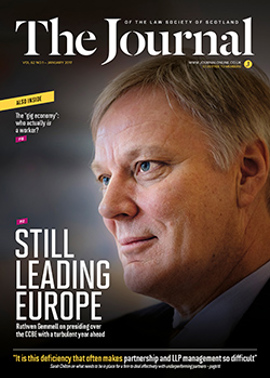Solemn procedure: beware the changes
On 17 January 2017 the Criminal Justice (Scotland) Act 2016 (Commencement No 3 and Saving Provision) Order 2016 (2016/426) brings into force various provisions of the Criminal Justice (Scotland) Act 2016. This makes a number of changes to procedures which those members involved in court work should be aware of.
The most significant parts of the 2016 Act are ss 78, 82 and 83, which make amendments to the Criminal Procedure (Scotland) Act 1995 in relation to solemn procedure.
Section 78 changes the procedure to be followed at what are usually the first court appearances of a person being prosecuted under solemn procedure, when the person appears on petition. The purpose of these provisions is to abolish the procedure (commonly known as judicial examination) whereby the prosecutor can, at the commencement of a case being prosecuted under solemn procedure, question the accused in the presence of the sheriff. In addition, s 78 removes the option for the accused to make a declaration at that stage in proceedings. Article 3 of the order is a savings provision to continue the effect of certain provisions of the 1995 Act repealed by s 78 in relation to judicial examinations occurring before 17 January 2017.
Section 83 repeals that part of s 77(1) of the 1995 Act which requires that the accused pleading guilty to an indictment should sign a copy of the plea. Section 70(7) of the 1995 Act, which provides for an exception to the signing requirement where the accused pleading guilty is an organisation, is also repealed.
There are a number of other provisions of the 2016 Act which solicitors should be aware of:
- Sections 60 to 64 make provision in relation to arrest and custody.
- Sections 87 to 96 make amendments to the 1995 Act in relation to appeals and references to the High Court by the Scottish Criminal Cases Review Commission.
- Sections 98 to 101 and 104 to 106 make provision in relation to appropriate adult support for vulnerable persons.
- Sections 110(2)(a) and 111(1) make provision in relation to, respectively, an appellant’s appearance at certain diets and the power of the High Court to make rules in relation to electronic proceedings.
In this issue
- Private prosecution: the Glasgow Rape Case revisited
- The commercialisation of space
- Feminism: all is not what it seems…
- Retaking the narrative on complaints
- Reading for pleasure
- Opinion: Alan McIntosh
- Book reviews
- Profile
- President's column
- RoS riding to the four (hundred)
- People on the move
- Scot in the European hot seat
- When partners fall short
- Uber: a great gig?
- Brexit: the end of cross-border practice?
- Closing in: the gender pay gap rules
- Simple procedure – it's complicated
- When changing the defender is OK
- Solemn procedure: beware the changes
- Divorce and the new state pension
- Delivery of alcohol: a “game changer”?
- A tale of two "Budgets"
- Scottish Solicitors' Discipline Tribunal
- "One-shot" rule sees rejection income soar
- Law without frontiers
- CJEU decision supports LPP protections
- Society thank-you for STARTS support
- From the Brussels Office
- Law reform roundup
- Expertise plus: promoting a sector strength
- Paralegal pointers
- What to do about client interest?
- Still free to market?
- New year, new contact
- Ask Ash
- Paying homage to King Cash






